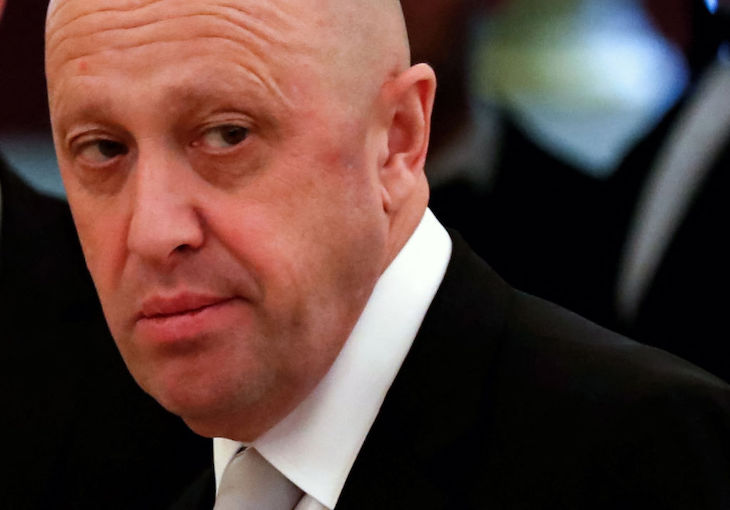Something strange is happening to Yevgeny Prigozhin. The chief of Vladimir Putin’s mercenary army in Ukraine has begun withdrawing his forces from Bakhmut, has all but conceded defeat in one of his most bizarre interviews yet, and, to top it off, now the journalist who interviewed him has been fired.
‘We came in boorishly, trampling all over Ukraine’s territory in search of Nazis. And while we searched for Nazis, we fucked up everyone we could,’ Prigozhin told the pro-war political journalist Konstantin Dolgov in an interview on Tuesday.
‘The special military operation was done for the purpose of ‘denazification’…But we ended up legitimising Ukraine. We’ve made Ukraine into a nation known all over the world. As for demilitarisation…. Fuck knows how, but we’ve militarised Ukraine!’
While Prigozhin has been known in the past for expletive-ridden tirades against defense minister Sergei Shoigu – raising some serious questions about why the Kremlin would allow him to do so while jailing others for far less – his latest sounds more like a litany of accusations levelled by Ukraine’s Western supporters against Russia. Russia’s most well-armed ‘patriot’ is basically admitting abuses in Ukraine and acknowledging that the ‘special military operation’ is a failure.
Prigozhin has been known in the past for expletive-ridden tirades
Earlier this month, Prigozhin threatened to withdraw his forces from Bakhmut, the eastern Ukrainian town that Wagner, his private military company, has been fighting for over eight months, losing some 20,000 soldiers in the process. But instead, after getting some token concessions from the defense ministry, Wagner pressed on. On 20 May, he claimed to have taken control of the town. Now, speaking from its ruins, Prigozhin announced that Wagner has begun withdrawing its forces from the captured city and handing over its positions to the Russian army. In a coup de grace of his brutal competition with defense minister Shoigu – signalling his magnanimity in a double-entendre – he ordered one of his soldiers to leave the army ‘some soap’.
Meanwhile, Dolgov, the journalist who aired his interview with Prigozhin on his own Telegram channel, claimed that the following morning he was fired from his job at the Telega Online, a small, government-funded streaming channel, after a ‘phone-call from above’ (though he was careful to leave the president out of it, saying that Putin ‘wouldn’t be happy’ to learn of the firing and appealing to him to stop the ‘lawlessness’).
Discontent from angry turbo-patriots about the course of the military operation is nothing new, but Prigozhin’s interview and subsequent actions exceeded this. The complaints by Prigozhin and other pro-war advocates are usually followed by calls on the Kremlin to declare war, announce a full-fledged mobilisation and stop hiding behind the half-measures that they consider the ‘special military operation’ to be.
In a sense, Prigozhin stuck to this line, saying that ‘we need to cut the fat’ and declare martial law. But what came next sounded more like a warning about how bad things were going to get if Russia were to continue waging the war than a constructive suggestion on how to win it:
‘Russia needs to take a page out of North Korea’s book for a certain number of years: close all our borders, stop pulling punches, bring back all our boys from abroad, and work hard. Then we’ll see some kind of result.’
Reading between the lines can be a counterproductive form of analysis, but amid the current paranoia that’s taken hold of anyone within a phone-call of the Kremlin, sometimes it’s all that’s left. In any case, some Russian observers see through the perfunctory remarks about preparing for a long war. Instead, they suggest that Prigozhin is signalling that Putin reconsider whether the fight is even worth it.
Indeed, raising the stakes and painting overly pessimistic scenarios could well be a passive-aggressive tactic of sowing doubt without actually spelling out what one wants. It’s the kind of thing that Prigozhin, who is prone to emotional outbursts and manipulation, and who is becoming increasingly vulnerable despite his claims about Bakhmut, would resort to.
Whether or not Prigozhin actually wants Putin to reconsider, it seems likely that’s what the Kremlin read into the interview, if Dolgov’s claim that he was fired after a telephone call is true.
Of course, none of this means that, even if Prigozhin was influential enough to push for such policy shifts, the Kremlin would reconsider anything. With Ukraine’s counteroffensive underway, and with Kyiv admitting Putin is at the top of its hit list, the Russian president wouldn’t be able to back down even if he wanted to. But, taken together, it is a telling revelation of the growing awareness in Moscow of what no one can say out loud: just how much this invasion was a mistake.






Comments